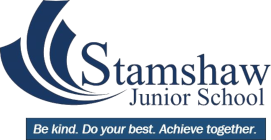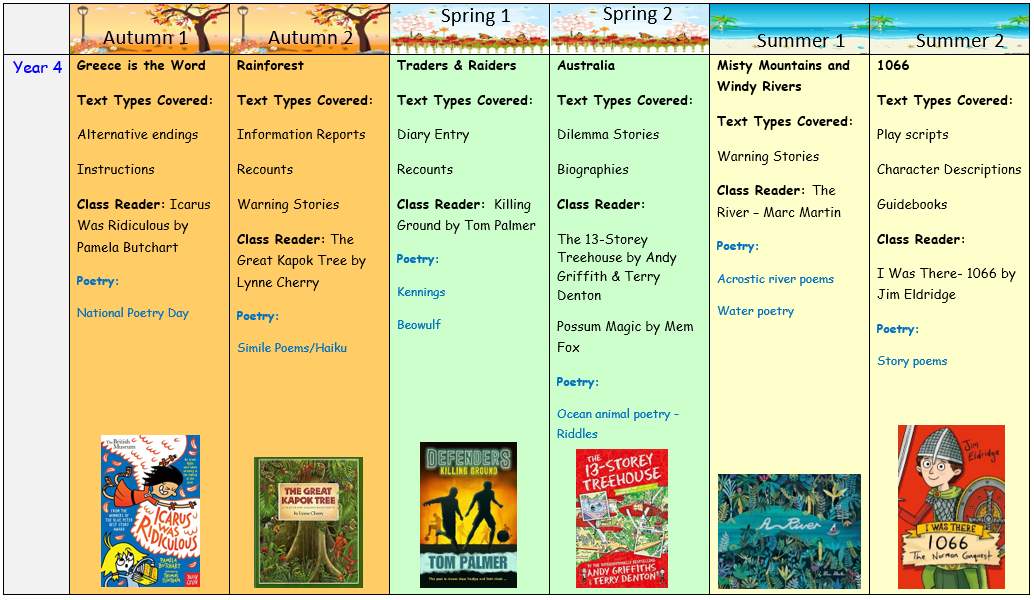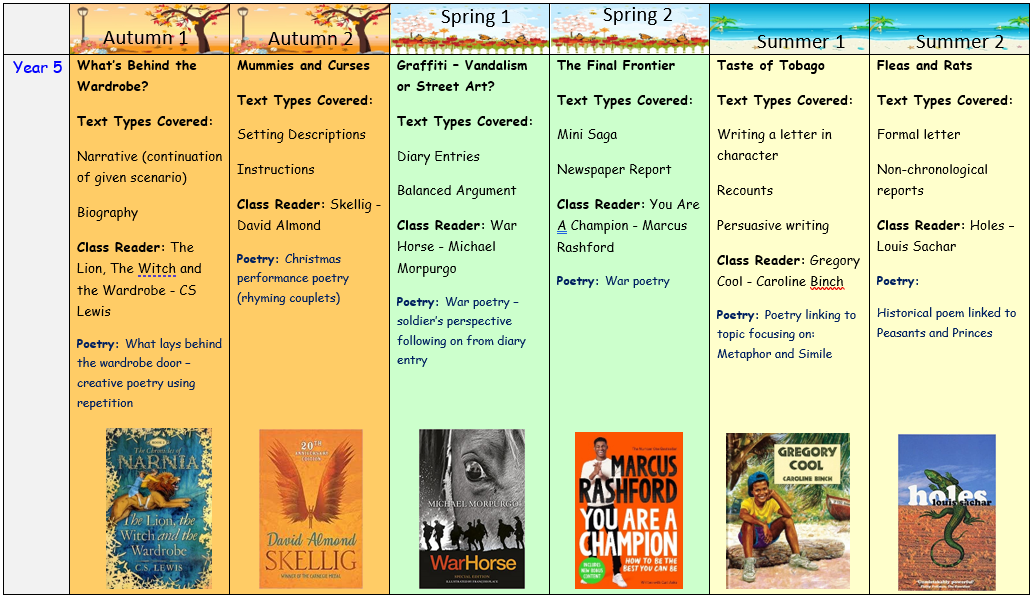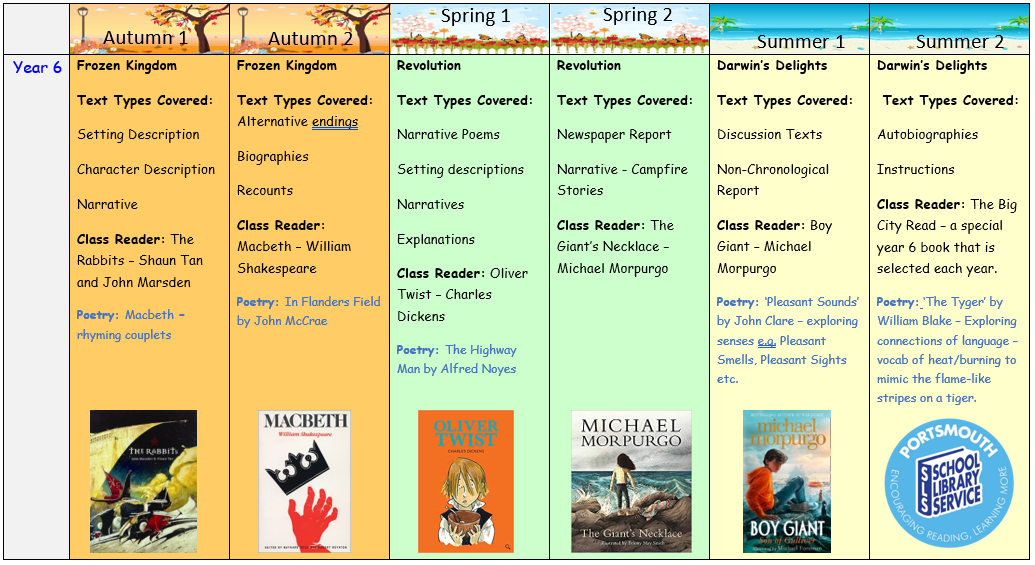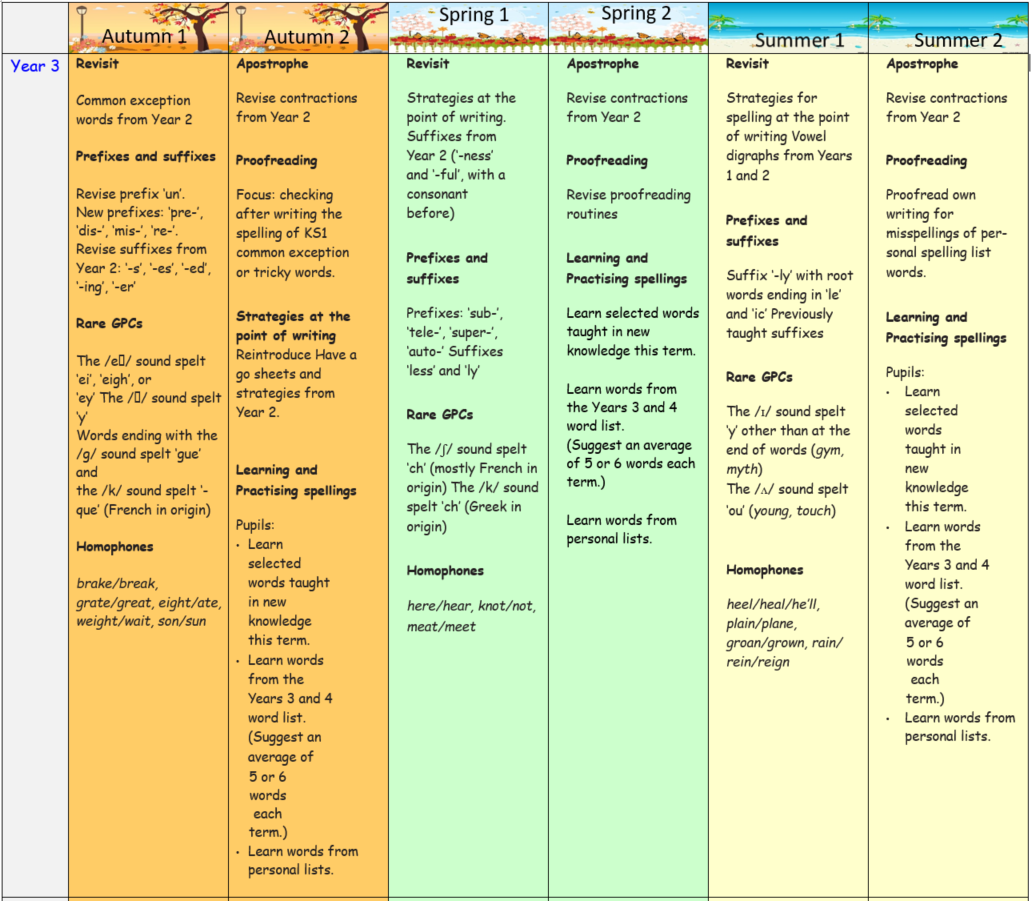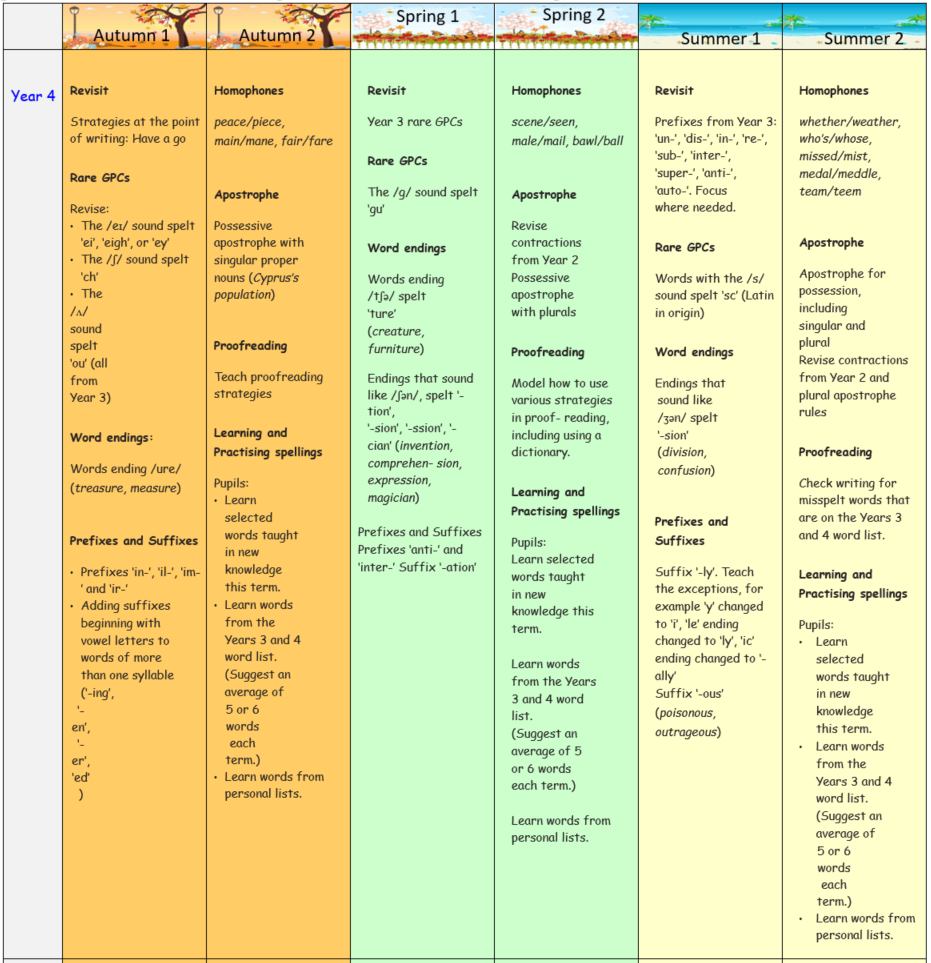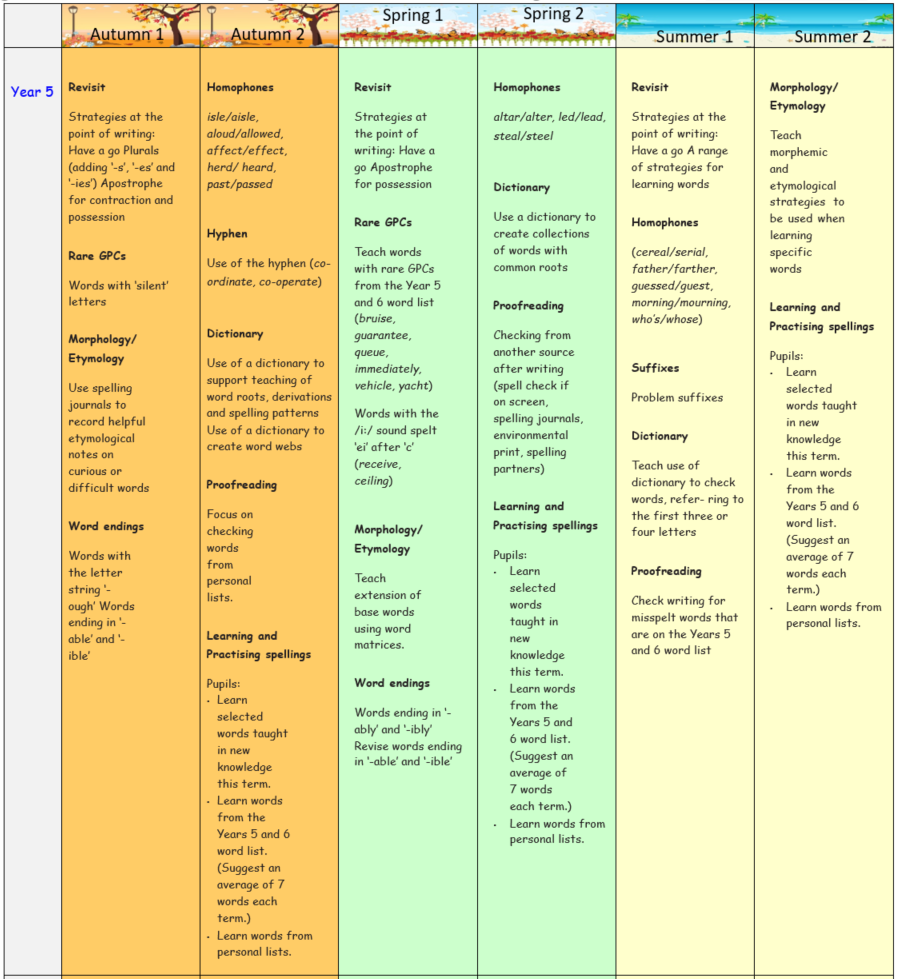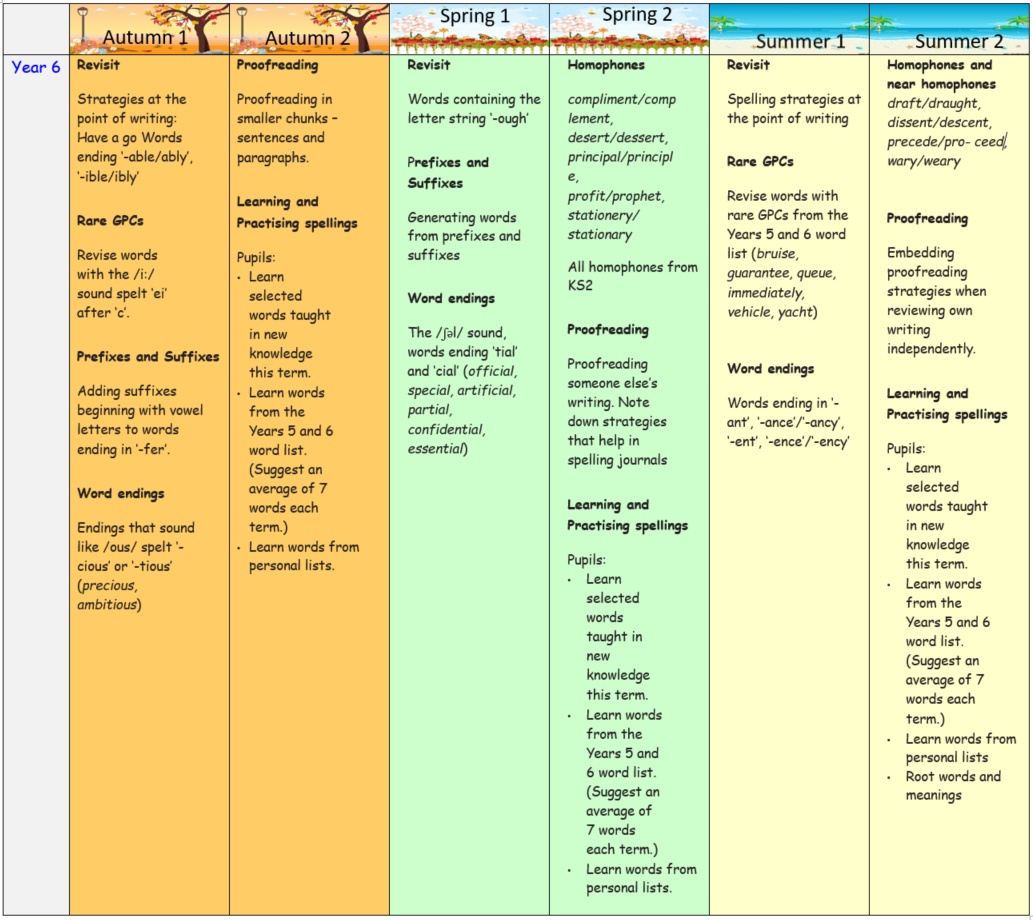English
Curriculum Statement
English at Stamshaw Junior School

Intent
At Stamshaw Junior School, we have designed our curriculum to develop our children’s love of reading, writing and discussion. The aims of the Stamshaw Junior English Curriculum are underpinned by those of the National Curriculum, and as a school, we use this as the starting point for our planning and ensure that coverage of these aims is fundamental to our teaching. We aim for children to be able to:
● read easily, fluently and with good understanding
● develop the habit of reading widely and often, for both pleasure and information
● acquire a wide vocabulary, an understanding of grammar and knowledge of linguistic conventions for reading, writing and spoken language
● appreciate our rich and varied literary heritage
● write clearly, accurately and coherently, adapting their language and style in and for a range of contexts, purposes and audiences
● use discussion in order to learn; they should be able to elaborate and explain clearly their understanding and ideas
● are competent in the arts of speaking and listening, making formal presentations, demonstrating to others and participating in debate
Our English overview sets out the learning opportunities and curriculum content for each year group.
As a staff we strive to be responsive to the needs of our children and the community we serve, therefore our curriculum intends to be more than just a vehicle for delivering the National Curriculum.
Positive relationships with the children help us shape our curriculum around their interests and what excites them. We use our ongoing assessment to close any gaps in the knowledge of the children and to challenge and stretch their understanding. English is taught every day at Stamshaw Junior School as a stand-alone subject, but also through every lesson we teach - as a school we expect the highest standards of literacy and oracy throughout our curriculum.
At Stamshaw Junior School, we believe that literacy skills are essential to a child’s development. A high-quality English curriculum gives children the tools they need to access education across the curriculum and to become successful beyond the classroom and into the wider world.
Implementation
Implementation
Our overarching Topics and class readers drive and inspire our English curriculum each half term. Through a child’s journey at Stamshaw Junior School, they will become familiar with six high-quality texts as a minimum per year (please see our overviews). The books have been specially selected by the staff team to enrich our curriculum as they hook children in and give a real purpose and means to write as opposed to teaching writing skills in isolation. We are rightly proud of the class readers as they allow the children to experience our rich literary heritage (for example Macbeth, The Iron Man and Oliver Twist); British history (1066 – I Was There (The Norman Conquest), Stig of the Dump) and inclusion and diversity (Long Walk to Freedom, Marcus Rashford’s You Are a Champion). We believe that this allows our children to enter ‘new worlds’ and the chance to spread their wings beyond their own environment and community. We encourage our children to seek out further books by the authors that we study or other books from the same genre.
As a school, we promote a love of reading and books. We have a bright and vibrant library at the heart of our school. It is well stocked with the latest titles from the School Library Service as well as staff and children’s recommendations. We celebrate World Book Day, host author events, take part in the Portsmouth Book Awards and send children to the Portsmouth Literature Quiz. All staff act as reading role models for the children and we actively promote independent reading through ERIC (Everyone Reading In Class) times and the use of Accelerated Reader.
We believe that children must first develop their reading fluency, as this is the key to nurturing a love of learning across all subjects. Children undertake four assessment per year using Accelerated Reader and these help to guide our staff when helping children to choose reading books. Our teachers and our librarian also use their own assessment and knowledge of children’s literature to support the children’s choices.
Across the whole school, children are also selected to continue their phonics and early reading learning by following a complete systematic synthetic phonics programme - our school uses ‘Little Wandle - Rapid Catch Up’. Children who have been identified as needing to ‘keep up’ with their phonics are assessed and then follow the programme: starting at the correct phonics stage to match their needs. Books are closely matched to the GPCs that the children are learning that week. Our ambition is that the children make rapid progress and that gaps in learning are closed so that they can access age related materials in class. All staff are fully trained in our SSP, not just those delivering the catch up programme, to ensure consistency across the curriculum.
We work closely with Stamshaw Infants School to ensure a smooth transition in every child’s English learning; we discuss at length the strengths and challenges for each child as part of our transition meetings.
Reading is taught daily using a whole class approach with support in place for any children who need additional adaptations. As part of our Reading lessons, we teach Vocabulary with children taught word definitions, word classes, pronunciation and how to use new words with the correct syntax (how to use them in sentences). Our whole class sessions also teach the skills of -
- Inference
- Prediction
- Explaining and evaluating
- Retrieval
- Summarising
In Writing, new content and objectives are introduced each year in-line with the statutory objectives of the National Curriculum. Teachers carefully select objectives (word, sentence and text level) that are appropriate to the text type that the children are writing. Across their four years at Stamshaw, children will write for a wide range of audiences and purposes (please see the detailed English long-term plan for more information on the writing opportunities in each year group). All of the content for the year group is covered and revisited to ensure that children are confident in using it. Objectives are sequenced to ensure that children progress onto more demanding objectives in a way that best supports their learning.
We work towards longer pieces of writing using the process of plan, draft, edit and evaluate. The class reader alongside other high-quality model texts helps to shape and influence the writing that the children produce. There will often be links to our overarching Topics (History/ Geography/ Science) - this allows children to have a real purpose to their writing and means that teachers can introduce or revisit other parts of our curriculum in our English lessons.
Spoken language opportunities are developed across each year group with different objectives covered each half term. Teachers use ‘Communicating the Curriculum’ (from the Communication Trust) to effectively pitch the content for their year group.
Our lessons are inclusive and effectively dif to allow progress for all with the aspiration that all children can achieve the learning objective for the lesson. Children are encouraged to read their work aloud, present their ideas to others and develop their presentation skills within our sequences of lessons.
All teachers in our school aspire for their lessons to be ‘EPIC’ (see our Teaching and Learning Policy), which means that the learning opportunities for children are engaging, inclusive and memorable. Teachers use a variety of strategies to help children learn, including -
- group discussions and peer talk
- drama activities
- shared writing - this is where the teacher takes ideas from the class to write a piece together
- modelled writing - teachers show the children the process of writing and ‘think aloud’ while writing
- questioning - our teachers target their questions to challenge all children and use higher-order questions (‘Why do you think…?, Can you explain…?)
We follow a spelling programme called No Nonsense Spelling that helps the children in two ways - it introduces all of the spelling rules and content for each year and encourages children to work on the words that they find tricky - this is complemented by the use of personal dictionaries and word lists for some children. Teachers continue to develop phonics skills and use phonics terminology (in line with the Little Wandle SSP) within spelling lessons.
Teachers model and expect high standards of handwriting. Handwriting, including how to form letters consistently, the correct pen strokes needed to join letters and which letters to leave un-joined is taught. In the upper phase, children are encouraged to develop their own style whilst ensuring that their transcription remains joined and legible.
All of our learners are encouraged to refine and improve their work through timely and pertinent feedback - this could take the form of verbal feedback, colour marking with highlighters signposting the children to changes that they need to make and written feedback that provides challenge to the children (please see our Teaching and Learning Policy).
Impact
Impact
We use formative assessment to check the progress of the children in each lesson - questioning, live marking and verbal feedback help to ensure maximum progress. The children produce a minimum of 2 pieces of assessed writing per half term to help the teachers assess their level of understanding and to help inform future planning. We aim to make these pieces cross-curricula and across a range of text types. We use assessment criteria designed by the Portsmouth Literacy Hub to formally assess writing and meet as a team once a term to moderate our judgements and discuss children’s successes and next steps. Teachers use these assessment criteria as a guide and understand that not all objectives will be appropriate to the genre that the child has written.
We also meet with Stamshaw Infant School and with other schools from the Chichester Academy Trust to quality assure and moderate our assessment further.
Children complete a summative NFER Reading test once a term to check their progress - this score converts to a standardised score that we record into our tracking system (O’Track). Accelerated Reader ‘Star Assessments’ also help to inform teacher assessment. In the upper phase, children also complete a termly Spelling and Grammar test, with Statutory Assessment Tests (SATs) for children in year 6.
Our current curriculum has been in place since September 2019 and we have been working to improve and refine it since then. Our current teacher assessment shows that children are progressing well under our curriculum and that the curriculum is having a positive impact on attainment in each year group compared with attainment data from preceding years. As of 2023, our end of key stage results are broadly in line with national results.
All year groups meet with the head teacher and deputy head teacher once a term to discuss impact at pupil progress meetings. Pupil progress meetings allow teaching staff to evaluate the effectiveness of the provision in place, analyse attainment and progress data and make plans for how to change or refine our offer to ensure the best outcomes for all children. This could include; organising intervention groups; making changes to the content taught in each year group or deciding on areas of the curriculum that the cohort would benefit from revisiting.
Parents and carers play an integral part in our evaluation of the impact of our curriculum. We regularly seek feedback from parents and carers in relation to their child’s progress and value greatly the importance of school - home links in raising attainment in English. Parents receive formal feedback on their children’s English attainment and progress via written reports and parents’ meetings, while we also communicate home learning and praise via Marvellous Me (our parent engagement app).
Talking to children about their learning is a crucial to our understanding of the impact also, with pupil voice currently indicating that pupils at Stamshaw Junior School find their learning enjoyable and can talk about the subject with confidence.
The English subject lead and SLT regularly monitor the impact and effectiveness of English planning, teaching and feedback to ensure all learners in our school receive a high-quality English curriculum that meets the aims of this statement.
English Progression of Sequencing
Curriculum Overviews
Year 3
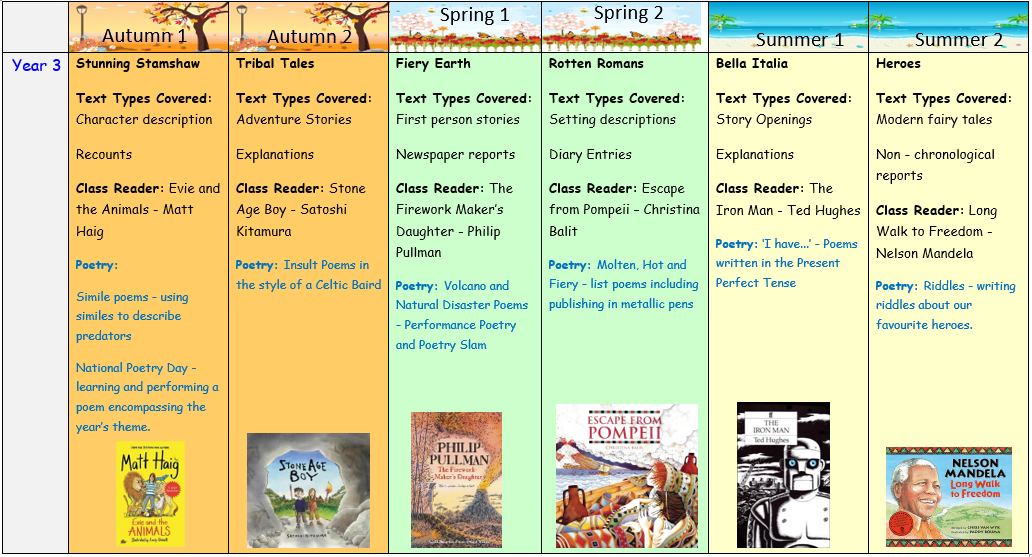
Year 4
Year 5
Year 6
Spelling Overviews
Click the links below to access year group spelling overviews
Year 3 - Spelling Overview
Year 4 - Spelling Overview
Year 5 - Spelling Overview
Year 6 - Spelling Overview



